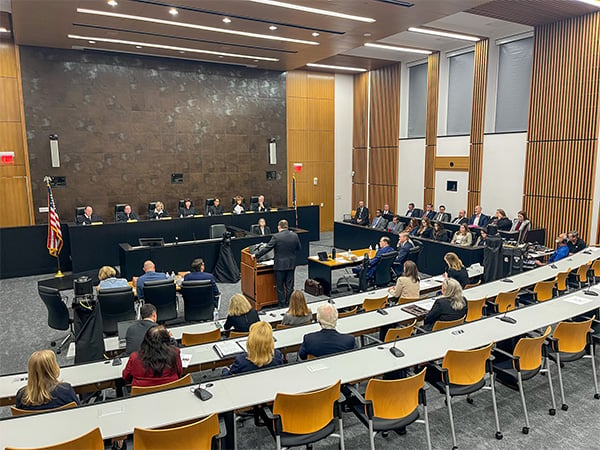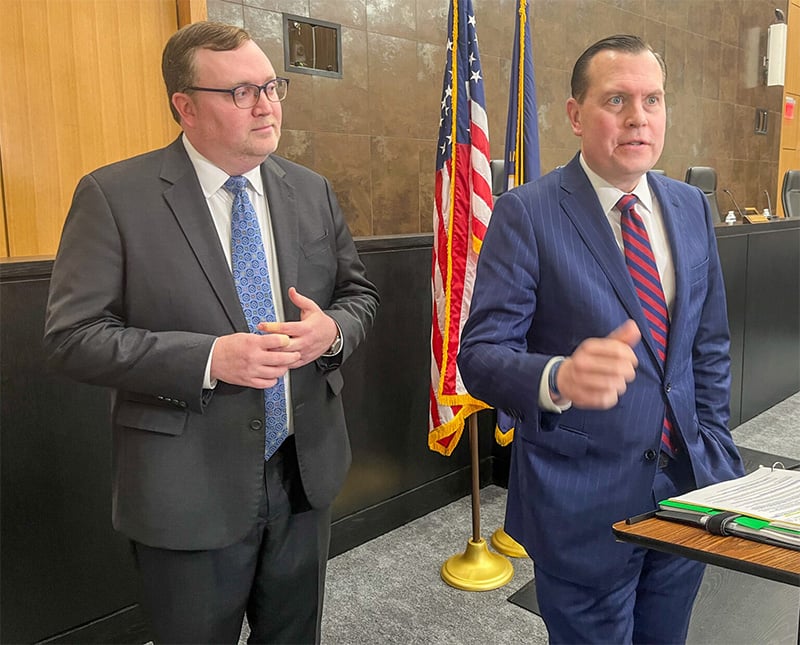By McKenna Horsley
Kentucky Lantern
Kentucky Supreme Court justices must once again balance power between the state’s executive and legislative branches.
The high court heard oral arguments in two cases Wednesday involving separation of powers between Democratic Gov. Andy Beshear and Republican office holders — a recurring theme during the governor’s two terms in office.

One case centered on a 2021 law that shifts control of the State Fair Board from the governor to the agriculture commissioner. The second restructures the Executive Branch Ethics Commission, allowing each of the constitutional officers (with the exception of the lieutenant governor) to appoint a member. The governor, who now appoints all five members, would have only two appointments under the contested law and the rest would go to Republican office holders — Attorney General Russell Coleman, Secretary of State Michael Adams, Auditor Allison Ball, Treasurer Mark Metcalf and Agriculture Commissioner Jonathan Shell
Beshear and lieutenant governor are the only two Democrats in the executive branch. He has repeatedly tried to fend off legislation that bolsters the authority of the General Assembly, which is controlled by Republican supermajorities in both chambers.
Though the cases deal with two different laws, lawyers before the court offered similar arguments in both of them. Matt Kuhn, the solicitor general in the attorney general’s office, argued that it is in the General Assembly’s purview to redistribute power within the executive branch. While discussing the Ethics Commission lawsuit, Kuhn pointed to Beshear’s disbanding of the previous commission in 2020 by way of executive order.
“No other governor has abolished the commission. No other governor has ensured immediately that that governor has a majority of appointees. That’s what the General Assembly was responding to,” Kuhn said, adding that legislators wanted to “spread the appointment power.”
The commission oversees ethical standards for all executive branch officials and employees.
Meanwhile, Beshear’s General Counsel Travis Mayo argued that governors typically enjoy “supreme” power as the head of the executive branch, elected by voters every four years. One of those powers is the ability to appoint members of commissions and boards and is in the state Constitution, he added.
The contested law involving the Ethics Commission removes “supreme executive power of appointment” from the commission that would “ensure that the commission faithfully executes the laws.”

“That violates the Constitution because it deprives the governor of the supreme executive power, and his ability to use that power of appointment, to ensure the laws are faithfully executed,” Mayo said.
The justices had questions for both sides. Justice Angela McCormick Bisig raised concerns during the Ethics Commission hearing about the court having to weigh the checks and balances between the legislative and executive branches under the state Constitution.
“So my concern, as may be articulated in the previous oral argument, is having that ‘check’ go too far in either direction, because we are tasked with enforcing all of those sections of the Constitution holistically, and they must work in harmony together,” she said.
Speaking to reporters after the hearings, Coleman, the Republican attorney general, said that he felt his office gave “two very successful arguments.” The attorney general also added that the crux of both cases is “the fact that the governor doesn’t like laws passed by the General Assembly — full stop.”
Asked if legislators would still feel motivated to enact such laws if the governor were a Republican, Coleman said the laws “just makes sense — Republican or Democrat.”
“The General Assembly under our Constitution makes policy,” Coleman said. “They make these determinations of how to shift power. We enforce them on the first floor (of the Capitol).”
Scottie Ellis, a spokesperson for Beshear said Thursday afternoon that the state Constitution says the “governor has the duty to ensure our laws are followed.”
“To do so, Gov. Andy Beshear should have the same authority as every governor before him,” she added. “The attorney general’s argument is that the General Assembly can take any executive power and move it away from any governor from a different party. It would render whole sections of the Constitution meaningless, take away the voters’ choice of who should have the powers of the governor, and eliminate the very separation of powers created by our Constitution.”
The Supreme Court met this week at the University of Kentucky J. David Rosenberg College of Law in Lexington. The court has been meeting across the state in recent months as part of an effort to educate the public on the court’s functions and proceedings.
Kentucky Lantern is part of States Newsroom, a nonprofit news network supported by grants and a coalition of donors as a 501c(3) public charity. Kentucky Lantern maintains editorial independence. Contact Editor Jamie Lucke for questions: info@kentuckylantern.com.

















